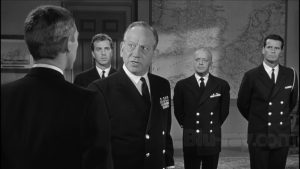THE AMERICANIZATION OF EMILY (1964)
One film that everyone should see -- especially Americans -- and especially Americans in positions of life and death authority such as peace officers and service personnel -- is The Americanization Of Emily (1964), directed by Arthur Hiller and written by Paddy Chayefsky (going very far afield from William Bradford Huie’s novel). Set in England before and during the invasion of Normandy, this dark comedy stars James Garner in one of his patented cynical-roué-with-a-heart-of-gold roles and Julie Andrews as a military driver about as far as imaginable from her wholesome turns as Mary Poppins and in The Sound Of Music (respectively released before and after this film). Emily also features James Coburn as Garner’s somewhat treacherous pal, Melvyn Douglas as the admiral they work for, and Keenan Wynn as a drunken sailor with the best line in the picture (“We ain't that stoned!”).
It’s a very literate and philosophical film (as was everything Chayefsky wrote) with a lot to think about in it, but there’s one crucial sub-plot that we all need to focus on.
Douglas’ admiral is responsible for the naval logistics behind the invasion of Normandy, and the mental strain weighs heavily on the man. As he starts to lose his grasp on reality, he develops an obsession that "the first dead man on Omaha Beach must be a sailor".
This sends Garner and Coburn off on a fool’s errand to film a documentary of the Navy’s combat engineers blowing up mines and other obstacles in advance of the actual invasion force. Garner drags his feet for obvious common sense reasons of not wanting to get killed, but Coburn becomes gung-ho about the project.
Douglas then suffers a full a full blown nervous breakdown, a psychotic fugue that temporarily incapacitates him but his orders, once put in motion, can now no longer be amended, changed, rescinded, or sidetracked. Suffice it to say Garner finds himself in the unenviable position of being "the first dead man on Omaha Beach”.
As soon as the admiral’s mind clears, he is horrified to find his underlings acted on what should have been obviously ignored as the product of a stressed mind reaching its breaking point. Garner’s documentary served no real purpose, dozens of lives were needlessly risked, and in the end Douglas is wracked with guilt that his psychotic obsession sent a valued and trusted aide to his meaningless death. (There is, of course, a nice double-twist reverse to end the movie on a high note, so don’t worry about this one being a downer; it’s tons o’fun.)
I want to focus on Coburn’s insistence of following through with Douglas’ orders despite the fact he acknowledges such orders are nonsensical! He tells Garner: “You…nearly got yourself court-martialed, stripped of your commission, sent to the Arctic Circle to do polar research. Man, you don't tell two-star admirals you don't approve of their orders. Now you're on the Admiral's brig list.”
Coburn’s method of handling things is to cut orders that let Garner delay the inevitable by a few days instead of bringing the real problem -- “The service takes a dim view of lieutenant commanders who call the Special Assistant to the Secretary of the Navy a nut” -- to anyone’s attention.
Sometimes, dammit, ya just gotta run that risk.
Though Emily doesn’t hang a lantern on this point, the facts are after WWII we executed Germans and Japanese who did exactly what Coburn’s character did: Just followed orders.
They surrendered their integrity and their humanity by never questioning or challenging the orders handed down from above. They followed through on them, even when they thought they were stupid and evil and self-destructive, because they thought they could escape moral and ethical responsibility by handing such decisions over to others.
No.
It doesn’t work that way.
The person on the other end of your club or your pepper spray or your gun or your drone targeting system will be hurt by your actions.
There is no escaping that.
It may well be that your actions can be justified -- you stop a deranged spouse from killing their family by shooting the attacker -- but it will nonetheless be your responsibility.
And you may find yourself in situations where you will agree wholeheartedly with those above you that a specific group needs to be attacked, and if so then you must own your moral and ethical choice: You share credit or blame, honor or guilt for something you did willfully.
There will come other times, however, when you will have your doubts, and perhaps even times beyond that when you will know what is being asked of you is wrong.
You must resist at those times.
You will not be held blameless for any harm that befalls someone unjustly on your watch.
You may escape legal responsibility for a time, but your actions will follow you, and whether the debt is paid directly or indirectly, it will be paid.
The Americanization Of Emily is a funny comedy, using dark humor to get its points across.
It can afford its cynicism: At the end of the day its actors removed their make-up, returned their costumes to wardrobe, and went home.
People in the real world aren’t afforded such luxuries.







